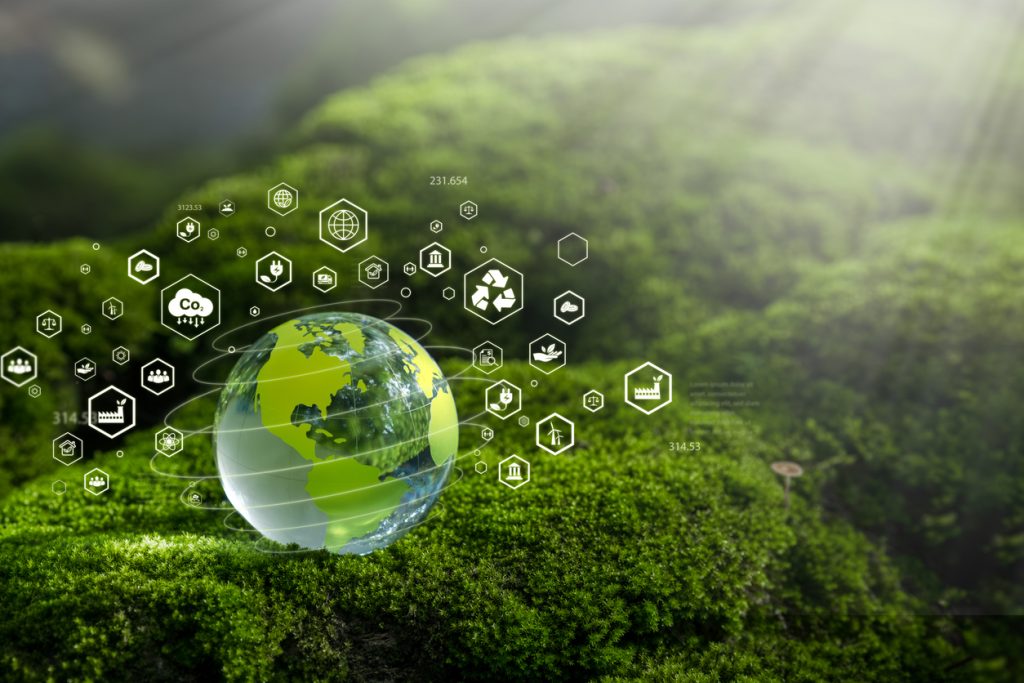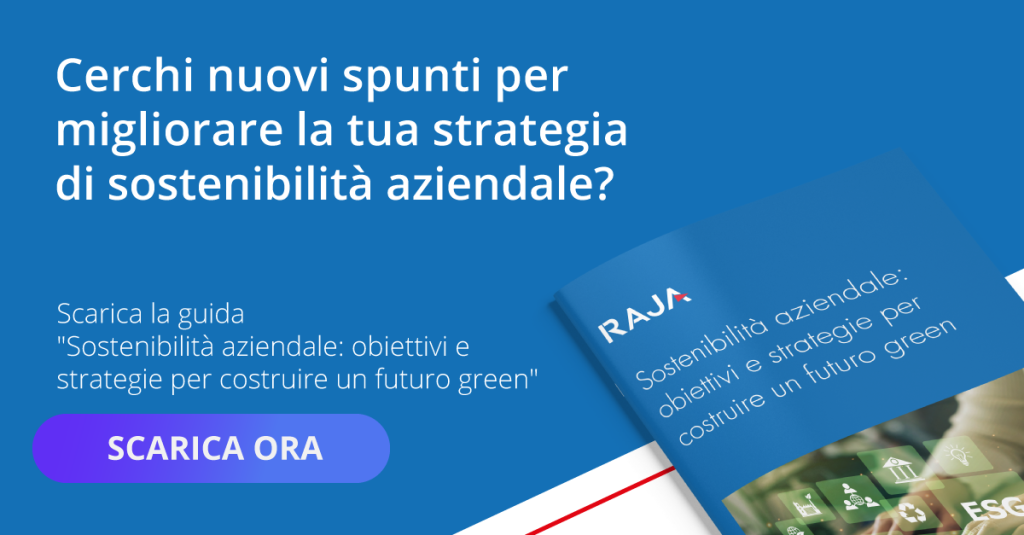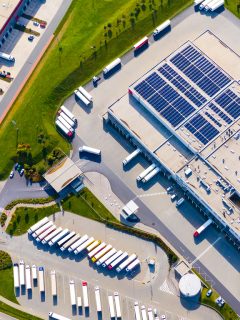Corporate sustainability is an approach that companies take to manage their operations so that they are economically profitable, socially responsible and ecologically sustainable. This means that companies try to balance the aim of making a profit with consideration of the social and environmental impact of their operations.
In practice, corporate sustainability implies:
- Social responsibility: Committing to respect human rights, promoting gender equity, ensuring safe and ethical working conditions, and contributing positively to the communities in which they operate.
- Environmental management: Seeking to minimise the environmental impact of operations. This includes adopting sustainable practices such as recycling, saving energy, using environmentally friendly materials and reducing greenhouse gas emissions.
- Economic sustainability: Maintaining long-term profitability by planning sustainable investments and making financial decisions that consider the long-term impact of actions.
- Transparency and accountability: Transparency in reporting on actions taken to achieve sustainable goals and accountability in addressing challenges and critical issues.
Corporate sustainability has become increasingly important in recent years due to growing concerns about environmental and social issues. Companies that embrace sustainability not only contribute to a better world, but often also improve their reputation and customer trust.
Corporate sustainability and ESG regulation
Corporate sustainabilityis at the heart of ESG regulation in Italy and is guided by Legislative Decree 254/2016. This decree introduced mandatory non-financial reporting for companies, requiring them to assess the impact of their activities on environmental, social and governance issues. Companies must now provide detailed information on the sustainable policies adopted, actions taken and results achieved. This transparency aims to promote greater awareness among stakeholders and encourage responsible and transparent business ethics.
Required information includes water management, policies to reduce greenhouse gas emissions, waste management and recycling, commitment to labour rights, gender equity and social inclusion. On the governance side, non-financial reporting highlights anti-corruption practices and executive remuneration policies.
This approach to non-financial reporting is not only a regulatory compliance, but also a push for companies to review and improve their internal practices. The sustainability report becomes a tool for dialogue with stakeholders, enabling them to understand the company’s commitment to sustainability and make informed decisions.
Sustainable Development Goals: what they are and how to apply them
TheSustainable Development Goals(SDGs) are a set of universal targets adopted by the United Nations in 2015, aimed at ending poverty, protecting the planet and ensuring peace and prosperity for all by 2030. These goals, which include topics such as combating climate change, reducing inequality and promoting quality education, provide a framework for companies to integrate sustainable practices into their business processes.
Companies can implement these goals through various corporate sustainability strategies, such as adopting green policies, investing in sustainable technologies, and promoting a corporate culture focused on social responsibility. Implementing the SDGs not only helps reduce environmental impact, but can also improve corporate image, strengthen stakeholder relations and drive innovation for sustainable development.
Sustainable packaging: a necessary revolution
Corporate sustainability comes above all from our daily decisions, apractical example being the use ofsustainable packaging for your product shipments .
The transition to sustainable packaging has become a necessity, driven by increasing consumer awareness and demand for eco-friendly solutions. Secondary packaging is essential in the distribution chain to protect products during transport and storage, an e-commerce business for example cannot do without it. Packaging is considered sustainable when it is made of recyclable, biodegradable or compostable materials, helping to reduce the company’s environmental impact.
4.0 technologies for the manufacturing industry
Advanced technologies can support and further improve sustainable practices in the company. 4.0 technologies represent a qualitative leap in the manufacturing industry in particular, marking the shift towards advanced automation and digital intelligence .
These technologies, including artificial intelligence, Internet of Things (IoT), advanced robotics, augmented reality and big data analytics, enable factories to become more efficient, responsive and adaptive. Machine interconnectivity and real-time data analysis improve decision-making, optimising the supply chain and resource management.
In addition, the adoption of cyber-physical systems enables more precise control of production processes, reducing waste and improving safety. This digital transformation, an integral part of the Fourth Industrial Revolution, opens up new possibilities such as customised production and improved after-sales service through the collection of product data. Smart factories, thanks to 4.0 technologies, not only increase their competitiveness, but also contribute to a lower environmental impact, aligning with sustainability goals.
Artificial intelligence at the service of the circular economy
The use of ArtificialIntelligence (AI) is revolutionising the approach to the circular economy, which aims to reduce waste and promote resource recycling. This change is essential to address the challenges of low residual value of used products, collection and separation of materials and traceability in recycling processes.
One of the main contributions of AI is in extending the useful life of products through over-the-air software updates. These updates keep products up-to-date, increasing their residual value. For example, smartphones, tablets, computers and car components can receive software updates without the need for physical connections. This technology allows manufacturers to quickly distribute improvements and new features directly to users’ devices.
Artificial Intelligence is becoming a key element in promoting the circular economy, addressing thechallenges of recycling resources andextending the useful life of products. These developments show how AI can be used in innovative ways to create a more sustainable economy and reduce environmental impacts.

Green Economy for your business growth
Speaking more broadly about the impact of sustainability on contemporary society, we can introduce the concept of theGreen Economy, a model that emerged in response to the increased focus on sustainability. The Green Economy, or sustainable economy, represents an economic development model that focuses on environmental sustainability .
This innovative approach combines economic growth and ecological responsibility, encouraging companies to invest in clean technologies, renewable energy and environmentally friendly production processes. Companies adopting this model often introduce strategies to reduce the use of non-renewable resources, optimise waste management and improve energy efficiency.
Aconcrete example of sustainable economics in the corporate world could be the adoption of solar or wind energy systems to power operations. Companies can also invest in research and development to create more sustainable products or renew production lines in a greener way. Reducing carbon emissions and implementing sustainable labour policies are other crucial aspects of the green economy.
Moreover, the green economy is not only about the environment, but also aboutsocial equity and economic well-being. This means working towards reducing inequalities, promoting sustainable employment and ensuring fair working conditions.
Companies that follow these principles not only improve their image and reputation, but also gain access to new markets and business opportunities, as consumers and partners are increasingly oriented towards sustainable choices.
Finally, the transition to a green economy can also stimulate innovation. Addressing sustainability challenges often requires new ideas and creative solutions, pushing companies to be more innovative and competitive. This change can lead to greater business resilience and better preparedness for the future in a world where environmental issues are becoming increasingly important.
Green mobility to cut emissions
Green mobility is a key element in reducing CO2 emissions and environmental impact. This strategy includes the adoption of electric vehicles, bicycles, environmentally friendly public transport and theimplementation of car sharingand bike sharingsystems. The use of these sustainable transport solutions not only decreases greenhouse gas emissions, but also helps to improve air quality and reduce noise pollution in urban areas.
Furthermore, a key aspect of green mobility is the development of urban infrastructure that supports these forms of transport, such as bicycle lanes, electric vehicle charging stations and low-emission zones. Companies can encourage this transition by adopting eco-friendly corporate policies, such as smart working that reduces the need for daily commuting .Investing in research and development for advanced mobility technologies, such as autonomous electric vehicles, can also lead to a significant reduction in CO2 emissions in the long term, thus contributing to a more sustainable future.
If you want to learn more about how to make your company more sustainable, don’t miss our e-book: Corporate sustainability: goals and strategies for building a green future.
Perishable goods: how to transport them?
The transport of perishable goods represents a significant logistical challenge, requiring meticulous attention to various factors to ensure product quality and safety. The effective handling of these products requires the use of advanced technologies, such as specialised refrigeration systems and packaging that maintains product integrity. Real-time monitoring is essential, with IoT sensors providing continuous data on temperature, humidity and other critical environmental factors.
Strategic logistics planning is crucial to minimise transit time and ensure that goods arrive fresh at the recipient. Companies must choose the most suitable modes of transport, such as air freight for extremely perishable products or optimised land routes for shorter distances. The cold chain must be maintained without interruption, from the moment of pick-up to delivery, to avoid any deterioration in quality.
Collaboration with logistics partners who have experience in handling perishable goods is crucial. These partners can offer tailor-made solutions based on the specific requirements of the product, from vehicle type to route planning. Analysis of historical data can also help identify critical points in the supply chain and take preventive measures in the future.
Furthermore, the adoption of sustainable practices in the transport of perishable goods has become increasingly important and includes, for example, the use of environmentallyfriendly vehicles that reduce the environmental impact of logistics operations. Some companies are exploring the use of drones or autonomous vehicles to deliver perishable products to hard-to-reach areas.
In the food sector, attention to packaging is crucial. Forexample, refrigerated containers forfood transport represent a challenge in food e-commerce. The goal is to develop sustainable solutions that are lightweight and robust, reducing the use of raw materials and the environmental impact of transport, while ensuring the freshness and safety of products.
The transport of perishable goods requires a combination of advanced technology, strategic planning and collaboration with reliable partners. As thedemand for fresh, high-quality products increases, companies must continue to innovate and improve their logistics strategies to remain competitive in this rapidly evolving sector.
Sustainable food and the food supply chain
Sustainable food and the food supply chain are crucial issues in the context of ecology and sustainable development. Sustainable food refers to food consumption and production practices that have a low environmental impact, promote food security and ensure a fair distribution of resources .This approach includes the choice of local and seasonal products, thus reducing food transport emissions and supporting local economies.
In the agri-food chain, sustainability implies adopting environmentally friendly cultivation and breeding methods, such as organic farming and reducing the use of pesticides and chemical fertilisers. It is also important to minimise food waste at all stages of the chain, from production to consumption. Companies can contribute by promoting environmentally friendly packaging practices and recycling systems.
Raising awareness and educating consumers on sustainable food choices are key to promoting lasting change.
Finally ,collaboration between producers, retailers, governments and consumers is essential to create a sustainable food system. This includes policies and incentives that support environmentally friendly farming practices, research and development in sustainable technologies, and public awareness programmes. As global awareness of climate change and the importance of biodiversity increases, sustainable food and responsible management of the agri-food supply chain become increasingly relevant to building a greener and healthier future.
RAJA Group for sustainability
The RAJA Group has always been committed topromoting corporate sustainability through a number of significant initiatives. Sustainability is at the core of our operations and is a fundamental pillar of our corporate philosophy.
Constant monitoring of environmental impact
Constantmonitoring of ourenvironmental impact is a priority. This involves in-depth analysis of our operations, including waste management, greenhouse gas emissions and supplier assessment. We use the data collected to identify areas for improvement and develop effective solutions.
Adapting sustainability strategies
Our sustainability strategies areconstantly evolving to adapt to internal and external changes. We actively respond to internal changes, such as business growth and evolving production processes, to ensure that sustainability remains at the core of our operations. This may involveupdating internal guidelines and trainingemployees on sustainable practices. We also adapt to external changes, such as new environmental regulations and consumer expectations, to ensure that our suppliers meet the latest environmental standards.
Examples of concrete initiatives
RAJA has introduced a number of concrete initiatives to promote corporate sustainability, including:
- The use of eco-friendly packaging with recycled and biodegradable materials, thus reducing environmental impact.
- The promotion of correct recycling of packaging among our customers, providing them with the necessary information and support.
- Collaborations with suppliers, customers and environmental organisations to promote sustainable practices throughout the value chain.
- The adoption and promotion of the 5Rs (Reduce, Reuse, Redesign, Renew, Recycle) as part of our corporate philosophy to minimise waste and optimise the use of resources.
- The 92% of our packaging is produced in Europeensuring high standards of quality and sustainability, as well as reducing the carbon footprint associated with long-distance transport.
- Significant reduction in the sending of paper catalogues over the past 5 years, demonstrating a commitment to paper reduction and the adoption of more sustainable communication methods.
- The birth of the ‘Women & Environment’ programme, the RAJA-Danièle Marcovici Foundation, founded in 2006, supports humanitarian projects to improve the living conditions of women worldwide. Through the “Women & Environment” programme, launched in 2015 by the RAJA Group, it funds eco-solidarity projects in favour of women and the environment. In 7 years, more than 2.5 million euros have been raised by the RAJA Group across Europe, supporting more than 70 projects. Thanks to this initiative, between September 2021 and February 2022, RAJA Group’s European subsidiaries raised €306,152, supporting 6 significant projects.
RAJA is committed to being not only a reliable supplier of packaging and logistics solutions, but also a partner in your company’s ecological transition. We recognise the importance of corporate sustainability and our role in promoting eco-friendly practices. For this reason, we offer our customers a range of packaging options made from recyclable and sustainable materials. In addition, we are constantly working to improve our supply chain and reduce our overall environmental impact. We are ready to help our customers implement sustainability strategies by providing advice and innovative solutions.
By choosing RAJA as a partner, companies can actively contribute to reducing their ecological footprint and take an environmentally responsible approach while ensuring the operational efficiency and quality of their products.















